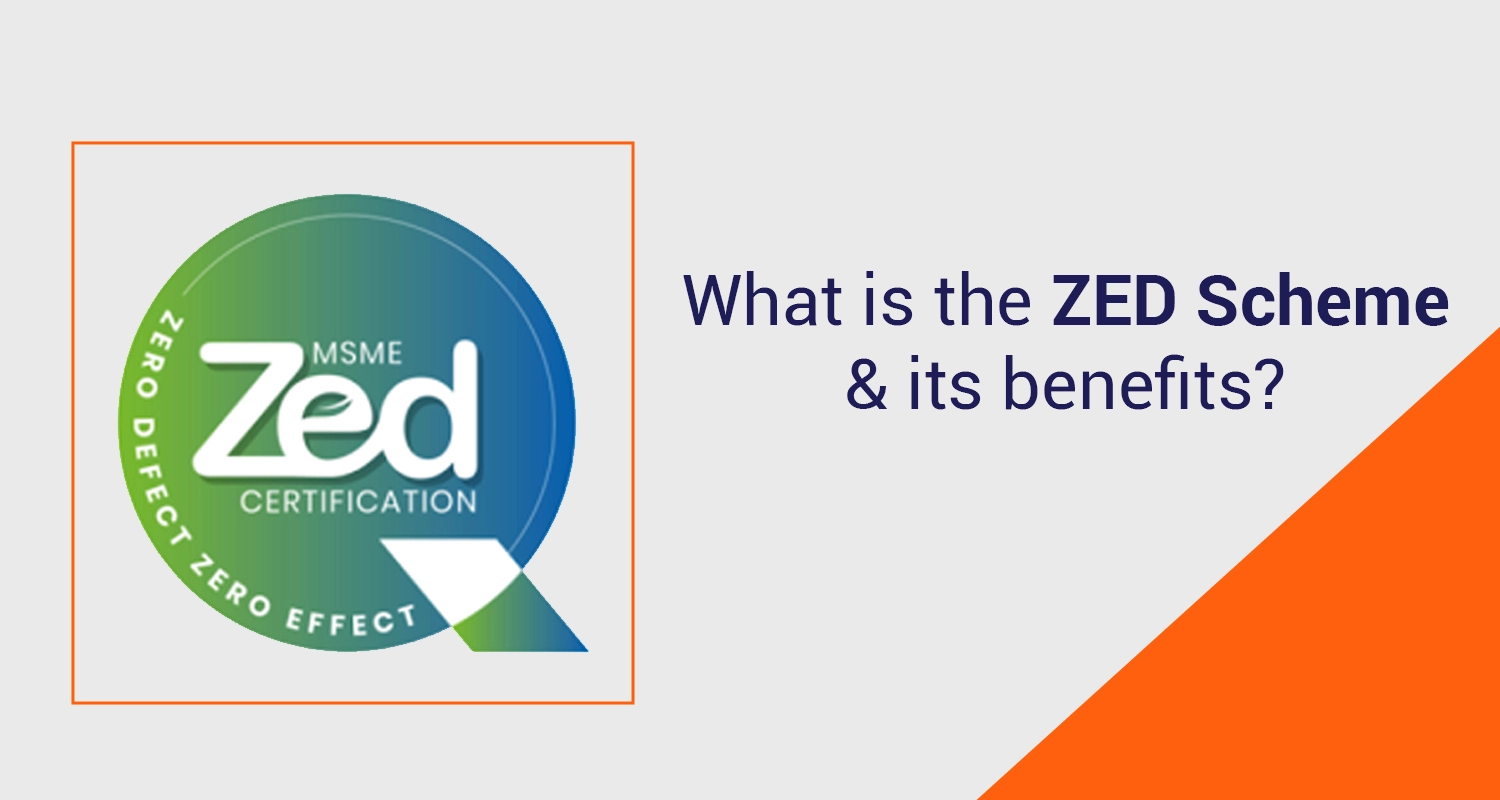What is ZED Scheme & its Benefits

Ensuring India's MSME sector remains competitive is crucial for overall manufacturing sector growth and the economy. Global companies succeed by emphasising cost competitiveness, technology, innovation, service delivery, lean manufacturing, and zero defects. Accelerating industrialisation and export-driven growth is key to establishing India's presence in global markets and matching the global companies. One way to do so was by targeting zero-defect quality in our production through the ZED scheme.
The ZED Scheme is not just a standalone initiative. It's part of the 'Make in India' and 'Zero Defect and Zero Effect' initiatives, which signify the government's commitment to using manufacturing as a growth engine. What exactly is the MSME ZED scheme, and how does it benefit the MSMEs? Let's find out.
What is the ZED scheme?
The ZED certification scheme is a voluntary program encouraging MSMEs to adopt excellent manufacturing practices. It includes a rating system to compare their capabilities against national and global standards, focusing on quality, productivity, innovation, and environmental sustainability. MSMEs undergo a thorough assessment by a ZED assessor. The evaluation involves on-site inspections of their processes, equipment, and management systems. The MSMEs are then rated based on the level of manufacturing capability, aiming for zero failures and minimal environmental impact. The ratings here range from ZED1 to ZED5, with ZED5 being the highest and best. This motivates manufacturers to achieve high-quality production. The ZED certificate offers three levels: Bronze (2.2 to 2.5), Silver (2.5 to 3.5), and Gold (3.0 to 3.5), reflecting different degrees of achievement within the scheme.
How will the ZED scheme help an MSME?
1. Industry Awareness Programs/Workshops:
MSMEs will learn about the MSME Sustainable (ZED) Certification through national awareness programs, which can be online or in-person. Industry Associations, Implementing Agencies, MSME-DIs, District Industries Centres (DICs), Large Enterprises/OEMs, and BEE (Bureau of Energy Efficiency) will assist.
2. Training Programs:
MSME Officers, Assessors, and Consultants will receive training on the MSME Sustainable (ZED) Certification. Partners like QCI (Quality Council of India), BIS (Bureau of Indian Standards), and NPC (National Productivity Council) will facilitate the implementation.
3. Assessment & Certification:
MSMEs will undergo various assessments, including desktop verification, remote assessment, and onsite assessment. They will receive certification based on the level they applied for, provided they meet all requirements.
Sapna aapka. Business Loan Humara.
Apply Now4. Handholding:
MSMEs will receive support to help them achieve higher ZED Certification levels. This includes guidance on technology upgrades to adopt zero-effect solutions, pollution control measures, and cleaner technologies.
5. Benefits/Incentives:
The Ministry of MSME will offer graded incentives to motivate MSMEs to reach higher ZED Certification levels. This will also include assistance under the MSME KAWACH program, which helps MSMEs with COVID-19 preparedness and response based on the WASH (Workplace Assessment for Safety & Hygiene) Standard.
6. PR Campaign, Advertising & Brand Promotion:
To popularise the MSME Sustainable (ZED) Certification, a national publicity campaign will be launched to promote the ZED brand.
7. Digital Platform:
The MSME Sustainable (ZED) Certification process will be streamlined through a single-window digital platform to minimise paper usage.
Eligibility for ZED scheme certification:
If your MSME is registered under the MSMED Act, 2006, or has a Udhyam registration, or as per executive orders by the Additional Secretary & Development Commissioner (MSME), you qualify for ZED certification registration. To apply, you'll need documents similar to those for business loans. The list includes the following-
- Business Registration
- Self-Assessment Report
- Financial Statements
- Quality Management System (QMS) Documentation
- Environmental Management System (EMS) Documentation
- Energy Management System (EnMS) Documentation
- Safety Management Documentation
- Human Resource Management Documentation
- Intellectual Property Rights (IPR) Documentation
- Design Management Documentation
- Udyam Registration Number of the Enterprise
Process to avail of the ZED scheme:
Every MSME starting the ZED journey must take a “ZED Pledge” before they apply for a ZED Certification Level (Bronze, Silver, Gold). The purpose of the ZED Pledge is to make a pre-commitment. After taking the pledge, MSMEs can access WASH Standard certification and other capacity-building measures through MSME KAWACH. Once the ZED Pledge is taken, the MSME can apply for a Certification Level that it qualifies for.
Then, to start with the registration, you can download the application form from the ZED online portal. Here are the steps that follow after this-
- Register for free on the ZED portal using your mobile number and email address.
- Complete the online assessment for ZED parameters.
- Next is the Desktop Assessment.
- If you pass, a Site Assessment follows.
- MSMEs that get rated can consult an authorised ZED consultant for guidance and gap analysis.
There are a few more steps to getting ZED certified. First, you'll need to submit an Undertaking. If something isn't quite right during the assessment, they'll give you time to fix it before you can get certified. Finally, the official ZED certificate comes from a special approved agency. Even after you're certified, the government might check in to ensure everything's still on track, especially if you got help from the program.
MSME ZED Scheme benefits:
- The government of India subsidises up to 85% of ZED certification costs for MSMEs (80% for Micro, 60% for Small, and 50% for Medium; an additional 5% for SC/ST/Women/North East Region/J&K MSMEs). The incentives also include tax breaks and preferential treatment when bidding for government contracts.
- States like Punjab, Haryana, Odisha, Gujarat, Rajasthan, Daman & Diu, Dadra & Nagar Haveli, Uttar Pradesh, and Tamil Nadu provide financial incentives to ZED-rated MSMEs under their Industrial Policies to promote the ZED Scheme.
- Financial institutions such as the State Bank of India and Yes Bank offer price concessions and reduced processing fees to ZED-rated MSMEs. RBI has advised banks to include ZED information in MSME loan application forms.
- ZED-rated MSMEs gain enhanced visibility on the Government e-Marketplace (GeM), a National Public Procurement Portal.
- The top-performing ZED MSME units are selected by the Department of MSME and Export Promotion, which then gives them the award and prize. The industry, in turn, presents talent around the world. It assists in improving environmental equilibrium and grants them the status of a Responsible Manufacturer.
- MSMEs with a ZED rating can do in-depth studies using the ZED Certification Scheme, analyse global best practices, and apply them to their company. Their items with the ZED brand increase consumer confidence and revenue for their company.
- ZED certification can also increase productivity by improving the efficiency of processes and reducing waste. This is because ZED focuses on continuous improvement, which can lead to a more streamlined and efficient operation.
- ZED certification can also help to reduce the environmental impact of MSME operations. This is because the ZED scheme focuses on minimising waste and pollution. This can save the company money on disposal costs and improve its reputation with customers and stakeholders.
Is there any reward if I enrol in the scheme?
As an MSME owner, you’ll receive a joining reward of Rs.10,000 once you take the ZED Pledge. You need to use this reward within a set time for specific purposes. You can use the reward only once when applying for a ZED Certification (Bronze, Silver, or Gold). When you use it for certification, the reward amount will be deducted from the certification cost first. Then, if applicable, the subsidy will be applied.
For example, if you use the Bronze Certification reward, the cost becomes zero. Suppose you apply for Silver or Gold Certification. In that case, the reward will be deducted from the certification cost, and the subsidy will be applied to the remaining amount based on your MSME type (Micro, Small, or Medium). Remember, this reward is valid for only one year after taking the ZED Pledge.
Conclusion:
The Financial Support offered under the ZED scheme helps Indian MSMEs boost their global competitiveness. It promotes Zero Defect & Zero Effect manufacturing practices, enabling MSMEs to raise quality standards and reduce environmental impact, which is crucial for thriving in global markets. The ZED certificate, attained through a systematic assessment, propels their growth and sustainability in India.
FAQs:
Q1. Is ZED Certification mandatory for MSMEs?Ans. No, it's not required by the government. The ZED scheme is a voluntary program by the government that offers MSMEs a roadmap to global competitiveness.
Q2. Do I get relaxation in any other rules and regulations or certificates after I get the ZED certificate?Ans. If a unit is certified under the MSME Sustainable (ZED) Certification scheme, it doesn't mean they can skip other rules or certifications. ZED Certification focuses on process quality standards and doesn't replace other regulations or certifications.
Q3. Do ZED-certified units still need other certifications, such as ISO, to prove their credibility?Ans. ZED certification stands alone and isn't tied to ISO or similar certifications. Small businesses can pursue other certifications alongside ZED.
Q4. There are already many certification systems out there. Will the ZED scheme add to the burden for MSMEs?Ans. The ZED certification system aims to enhance business and significantly reduce costs. It's voluntary, and implementing ZED will benefit MSMEs rather than burden them.
Q5. Do consultants or organisations need ZED Scheme registration?Ans. Yes, consulting must be done through empanelled organisations. Guidelines for empanelment will be posted on the ZED website soon.
Sapna aapka. Business Loan Humara.
Apply NowDisclaimer: The information contained in this post is for general information purposes only. IIFL Finance Limited (including its associates and affiliates) ("the Company") assumes no liability or responsibility for any errors or omissions in the contents of this post and under no circumstances shall the Company be liable for any damage, loss, injury or disappointment etc. suffered by any reader. All information in this post is provided "as is", with no guarantee of completeness, accuracy, timeliness or of the results etc. obtained from the use of this information, and without warranty of any kind, express or implied, including, but not limited to warranties of performance, merchantability and fitness for a particular purpose. Given the changing nature of laws, rules and regulations, there may be delays, omissions or inaccuracies in the information contained in this post. The information on this post is provided with the understanding that the Company is not herein engaged in rendering legal, accounting, tax, or other professional advice and services. As such, it should not be used as a substitute for consultation with professional accounting, tax, legal or other competent advisers. This post may contain views and opinions which are those of the authors and do not necessarily reflect the official policy or position of any other agency or organization. This post may also contain links to external websites that are not provided or maintained by or in any way affiliated with the Company and the Company does not guarantee the accuracy, relevance, timeliness, or completeness of any information on these external websites. Any/ all (Gold/ Personal/ Business) loan product specifications and information that maybe stated in this post are subject to change from time to time, readers are advised to reach out to the Company for current specifications of the said (Gold/ Personal/ Business) loan.



